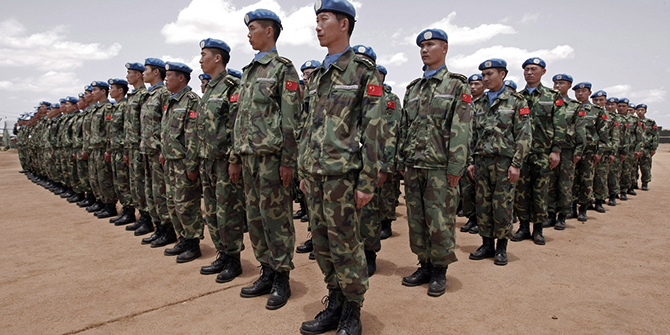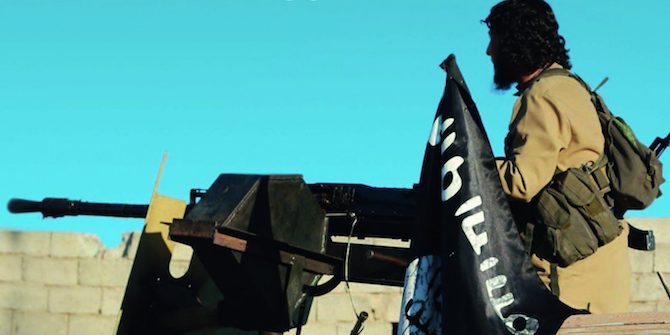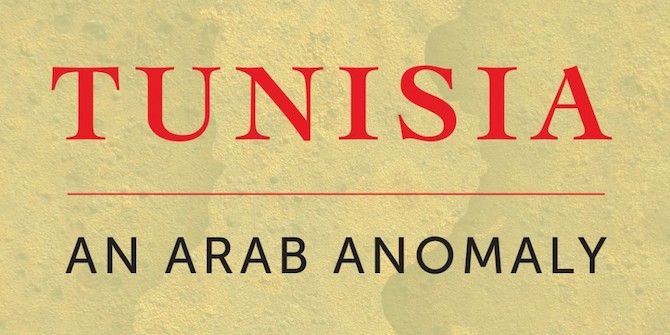By Zeynep N. Kaya

Mandy Turner and Florian P. Kuhn’s The Politics of International Intervention: The Tyranny of Peace (Routledge, 2016) is a brilliantly collated edited volume that brings together invaluable scholarly insights on intervention and peace. The book achieves the difficult task of combining rich critiques of the practices of peacebuilding with sound analyses on the conceptual underpinnings of liberal peace.
The Politics of International Intervention goes to the heart of a puzzling question: despite being so normatively desirable, why does the quest for peace lead to instability and violence? The book challenges associating such outcomes with social, political and economic structures or identity-politics in local contexts. Moreover, it goes beyond a simple engagement with the different sides of the debate on liberal peace and understands this phenomenon through a historical and conceptual analysis.
In doing this, the book adopts a wide definition of intervention that includes military involvement as well as sanctions, diplomatic or financial support for local elites and aid policies. The points made in the book on the importance of understanding the different ways in which societies respond to intervention and the complexity of the local-international interactions makes this wider conception of intervention convincing. Furthermore, the book’s analysis of the experiences of the intervention from the perspective of the intervened makes it a particularly valuable contribution to the field. In this context, the book claims to develop a ‘sociological’ understanding of peace and intervention. This branding is slightly confusing as the book heavily focuses on the political/normative aspects of intervention and how these are shaped by the expansion of liberal capitalism and Western security. Of course social phenomena are relevant to such processes, but that does not necessarily render the analysis sociological, in its disciplinary meaning. Therefore, the use of this concept ‘sociological’ begs for some clarification.
The Politics of International Intervention has a two-line argument and all the contributors consistently engage with this argument. First, intervention is the pursuit of the expansion and protection of liberal capitalism, its social relations and institutions. It aims to ‘police differences’ globally. Second, intervention is inherent in the Western-dominated international system. The chapters in the book explore different forms of global ‘policing of differences’ and how this policy affects different local contexts.
The first part of the book, composed of five chapters, elaborates on the contradictions within the concept and practice of liberal peace. Philip Cunliffe offers a historical perspective. He argues that peacekeeping (with normatively positive narrative) today and imperialism (a normatively negative one) in the past have both aimed at generating a single political order based on liberal government and market-capitalist society. Florian P. Kuhn draws attention to how the policy of peace, despite its peaceful narrative, disguises aggressive politics that aim to preserve existing security of the liberal capitalist core. Scott Kirsch and Colin Flint highlight the contradictions between the concept and practice of peace by showing how capital accumulation, state formation and militarisation based on Western principles in post-conflict reconstruction reinforce dynamics that emerge during conflict.
The first part of the book also offers two analyses that emphasise normative contradictions in peacebuilding policies. Michael Pugh highlights the exclusionary principles and practices of the political economy of peacebuilding that contradict the supposed values of tolerance in liberalism. From a gender norms perspective, Heidi Hudson argues that liberal peacebuilding victimises local women that need saving, and this actually leads to exclusionary outcomes.
The second part of the book focuses on experiences of intervention in the 2010s. While some authors in this part emphasise the liberal economic dimensions, others focus on both political and economic dimensions. Caroline Hughes explains how the UN mission in Cambodia re-integrated the country in the ‘regional capitalist economy’ through connecting local authoritarian elite with Western donors. Mandy Turner argues that Western aid and donor policies in the occupied Palestinian territory prioritised security and stability over economic development, human rights and democracy, which led to colonisation and fragmentation in the occupied territory. Bruno Charbonneau and Jonathan Sears explain French intervention in Mali as an example of peace-enforcement and neoliberal governance that lead to socio-economic splits in the society. Bruno Charbonneau, in another chapter, shows how the violence exercised in peace operations in Cote d’Ivoire was utilised by local elites, raising questions about divisions between ‘local’ and ‘international’.
Astri Suhrke points to the contradictions of intervention in Afghanistan where the interventionists carried out war and peacebuilding at the same time. They also tried to simultaneously generate an aid-dependent rentier state and a democracy that is accountable. Toby Dodge explains how the Western conception of ‘enemy image’, loaded with racist and Orientalist assumptions, shaped the policies of the US-led Coalition during the intervention of Iraq. Such a conception led to the mistake of complete exclusion and repression of Iraq’s old ruling elite and Sunni communities, which in turn played a key role in the ensuing civil war. Nicolas Pelham points to another mistake by interventionists, this time in Libya. Having learnt lessons from Iraq, the National Transitional Council integrated the ‘old guard’ but alienated those who led the rebellion against Qaddafi’s regime. In the case of Syria, Chris Phillips argues that despite the Western powers’ anti-interventionist rhetoric, regional and international actors intervened in the civil war through diplomatic protection, financing, and providing weapons and fighters. This implies again the necessity of applying a more inclusive definition of intervention.
The Politics of International Intervention is a thought-provoking and illuminating book. By incorporating different conceptual, theoretical and empirical lenses, and doing so in a coherent way, the book offers a rare opportunity to think about intervention through these lenses all at the same time. Moreover, reading the book, you find yourself witnessing deep discussions and thinking processes (which makes it a rather fascinating read) that led to this important contribution to the study of international intervention and peace.
Some contributors to ‘The Politics of International Intervention’ as well as the editors will be discussing their new book at LSE on Wednesday 23 March 2016.
 Dr Zeynep Kaya is Research Fellow at the LSE Middle East Centre. She is currently leading a research project examining at the role of international actors in enhancing women’s rights after military intervention, focusing on the Kurdistan Region of Iraq. She is also working on her book titled The Idea of Kurdistan: International Norms and Nationalism. She tweets at @zeynepn_kaya.
Dr Zeynep Kaya is Research Fellow at the LSE Middle East Centre. She is currently leading a research project examining at the role of international actors in enhancing women’s rights after military intervention, focusing on the Kurdistan Region of Iraq. She is also working on her book titled The Idea of Kurdistan: International Norms and Nationalism. She tweets at @zeynepn_kaya.






